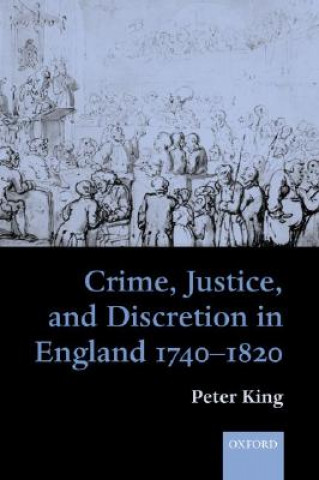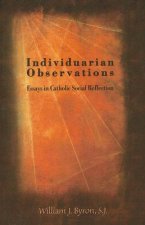
Kód: 04523527
Crime, Justice, and Discretion in England 1740-1820
Autor Peter King
The criminal law has often been seen as central to the rule of the 18th century landed elite in England. This book presents a detailed analysis of the judicial process - of victim's reactions, pretrial practices, policing, magistr ... celý popis
- Jazyk:
 Angličtina
Angličtina - Vazba: Pevná
- Počet stran: 398
Nakladatelství: Oxford University Press, 2000
- Více informací o knize

Mohlo by se vám také líbit
-

Deadpool Max: Involuntary Armageddon
702 Kč -

Many Faces of RNA
4952 Kč -

Individuarian Observations
587 Kč
Dárkový poukaz: Radost zaručena
- Darujte poukaz v libovolné hodnotě a my se postaráme o zbytek.
- Poukaz se vztahuje na celou naši nabídku.
- Elektronický poukaz vytisknete z e-mailu a můžete ihned darovat.
- Platnost poukazu je 12 měsíců od data vystavení.
Více informací o knize Crime, Justice, and Discretion in England 1740-1820
Nákupem získáte 774 bodů
 Anotace knihy
Anotace knihy
The criminal law has often been seen as central to the rule of the 18th century landed elite in England. This book presents a detailed analysis of the judicial process - of victim's reactions, pretrial practices, policing, magistrates hearings, trials, sentencing, pardoning and punishment - using property offenders as its main focus. The period 1740-1820, the final era before the coming of the new police and the repeal of the capital code, emerges as the great age of discretionary justice, and the book explores the impact of the vast discretionary powers held by many social groups. It reassesses both the relationship betweeen crime rates and economic deprivation, and the many ways that vulnerability to prosecution varied widely across the lifecycle, in the light of the highly selective nature of pretrial negotiations. More centrally, by asking at every stage who used the law, for what purposes, in whose interests and with what effects, it opens up a number of new perspectives on the role of the law in eighteenth century social relations. The law emerges as the less the instrument of particular elite groups and more as an arena of struggle, of negotiation and of compromise. Its rituals were less controllable and its merciful moments less manageable and less exclusively available to the gentry elite than has been previously suggested. Justice was vulnerable to power but was also mobilised to constrain it. Despite the key functions that the propertied fulfilled, courtroom crowds, the counter-theatre of the condemned and the decisions of the victims from a very wide range of backgrounds had a role to play, and the criteria on which decisions were based were shaped as much by the broad and more humane discourse which Fielding called the "good mind" as by the instrumental needs of the propertied elites.
 Parametry knihy
Parametry knihy
Zařazení knihy Knihy v angličtině Humanities History Regional & national history
7735 Kč
- Plný název: Crime, Justice, and Discretion in England 1740-1820
- Autor: Peter King
- Jazyk:
 Angličtina
Angličtina - Vazba: Pevná
- Počet stran: 398
- EAN: 9780198229100
- ISBN: 0198229100
- ID: 04523527
- Nakladatelství: Oxford University Press
- Hmotnost: 727 g
- Rozměry: 243 × 163 × 26 mm
- Datum vydání: 28. September 2000
Oblíbené z jiného soudku
-

Hundred Years' War on Palestine
356 Kč -

Ethnic Cleansing of Palestine
378 Kč -

History of Japan
403 Kč -

Ten Myths About Israel
341 Kč -

Strange Death of Europe
433 Kč -

Decline and Fall of the Roman Empire
139 Kč -

Secret History
303 Kč -

God's Playground A History of Poland
1700 Kč -

Mayflower
388 Kč -

How to be a Victorian
302 Kč -

Plantagenets
357 Kč -

General's Son
424 Kč -

Iran: A Very Short Introduction
283 Kč -

Temples of Karnak
3798 Kč -

Cuneiform
276 Kč -

Twenty Years A-Growing
250 Kč -

China in Africa
906 Kč -

History of Witchcraft in England from 1558 to 1718
460 Kč -

Islandman
311 Kč -

Bohemian Paris
415 Kč -

Alexiad
427 Kč -

Lancaster And York
490 Kč -

Modern France: A Very Short Introduction
336 Kč -

Inside Hitler's Greece
518 Kč -

Diana: Her True Story - In Her Own Words
323 Kč -

The Fourth Turning
393 Kč -

The Oxford History of Ancient Egypt
384 Kč -

Churchill: The Power of Words
433 Kč -

Palestine
564 Kč -

Korean History in Maps
706 Kč -

Great Gatsby (Wisehouse Classics Edition)
406 Kč -

Viking Way
1267 Kč -

The Thirteenth Tribe
309 Kč -

My Promised Land
378 Kč -

Vanished Kingdoms
542 Kč -

Age Of Revolution
410 Kč -

Life and Death of Anne Boleyn
585 Kč -

Coming of the Third Reich
463 Kč -

Children of Ash and Elm
487 Kč -

Europe Between the Oceans
799 Kč -

Socialism Betrayed
478 Kč -

303 Squadron
463 Kč -

Ancient Celts, Second Edition
655 Kč -

Dancing in the Glory of Monsters
396 Kč -

Battle of Britain: Luftwaffe Blitz (Images of War)
606 Kč -

Age of Confucian Rule
851 Kč -

Beyond Band of Brothers
410 Kč -

Benjamin Franklin
460 Kč -

On China
487 Kč
Osobní odběr Praha, Brno a 12903 dalších
Copyright ©2008-24 nejlevnejsi-knihy.cz Všechna práva vyhrazenaSoukromíCookies



 Vrácení do měsíce
Vrácení do měsíce 571 999 099 (8-15.30h)
571 999 099 (8-15.30h)